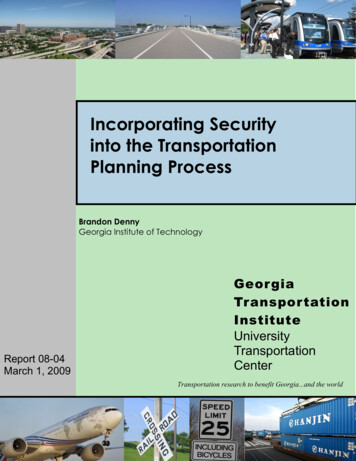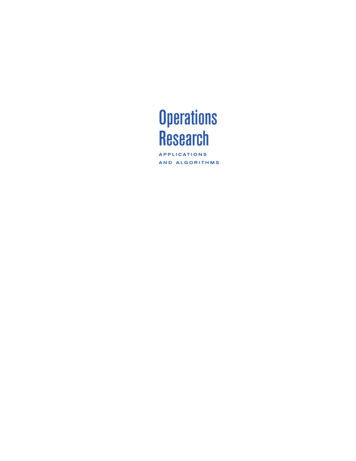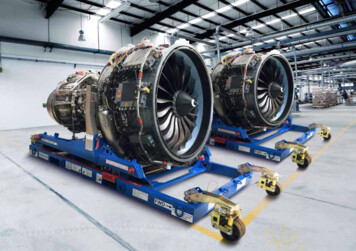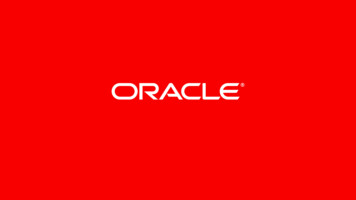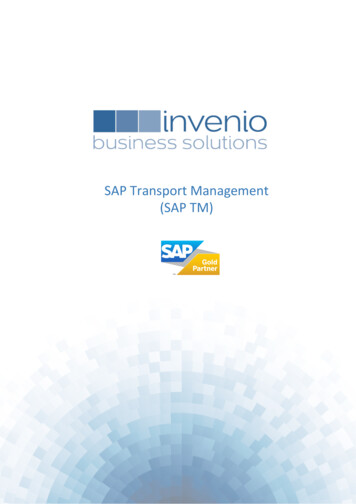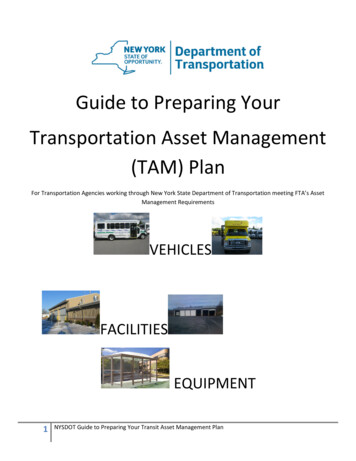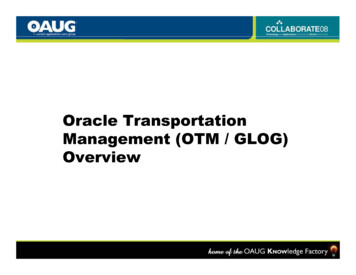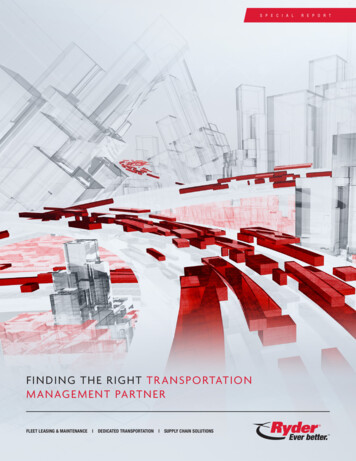
Transcription
S P E C I A LFI N DI N G T H E R IG H T T R AN SPO RTATIO NM ANAG E M E N T PART N E RFLEET LEASING & MAINTENANCE DEDICATED TRANSPORTATION SUPPLY CHAIN SOLUTIONSR E P O R T
Transportation managers face a litany of challenges intoday’s logistics environment. Driver safety and productivity,cost-cutting initiatives, capacity variability, regulatorychanges, fuel price volatility, and the need to get shipmentsto their final destinations quickly are all key concernsmaking the job more complex than ever.To make matters even more complex, disruptive forcessuch as the coronavirus pandemic, innovative technology,strict regulations, talent shortages, and infrastructurebottlenecks continue to be the prime focus for everylogistics management professional. Coupled with meetingthe rising demands of customers from both a tradition ande-commerce fulfillment aspect, the logistics landscape isevolving at an exponential rate.Over the next decade, the logistics industry will enter a newera, where these and other disruptive forces threaten tofundamentally change the rules of the game. The companiesthat adapt to beat these disruptions will create a biggercompetitive advantage for themselves today and inthe future.For logistics professionals, it is time for transformationalthinking. Customers want their products immediately - thedays of bulky shipments once or twice a week have beenreplaced with smaller, more frequent shipments.The companies that adapt to beatthese disruptions will create a biggercompetitive advantage for themselvestoday and in the future.This reality has created complexities for supply chains andhas also made a substantial impact on the transportationindustry as a whole. To achieve success, supply chainsneed a “perfectly integrated” transportation network that’sdesigned to meet consumer expectations in a world wheree-commerce, omni-channel, last mile challenges, andevolving regulations are all changing the supplychain landscape.Planning and executing the implementation of a “perfectlyintegrated” transportation network requires an approachthat’s not only efficient, but that’s also in perfect tune withthe dynamic nature of your business. However, managing atransportation network can be time consuming and costly.What do outsourced providers do differently thatindividual shippers can’t typically handle on their own?There’s no “one-size-fits-all” answer, but in nearly allcases an experienced third party will utilize best practices,engineering, analytics and other tools to identify costsavings, identify areas that need improvement, andimplement an end-to-end transportation strategy that’sefficient, safe, secure, and cost-effective.
The Benefts of the Right Transportation Management PartnerCompanies first started outsourcing logistical functions tothird parties in the mid-1970s. Throughout the 80s—asinformation technology (IT) advanced—the number ofthird-party logistics (3PL) providers ballooned. These 3PLproviders started leveraging new technology to bettermanage the transportation and warehousing of freight,attracting shippers looking for a simple and relativelyinexpensive way to integrate new technology into theirsupply chains.More recently, full-fledged transportation service providersemerged and began helping shippers reduce the cost offreight transportation while also increasing the overallservice delivery quality. As part of that value proposition,companies are able to focus on what they do best—runtheir core businesses—instead of spending time andmoney trying to navigate the ins and outs of the currenttransportation environment.When companies outsource transportation management,they can also improve performance across every mode oftransportation, get more value from transportation partners,gain more visibility into their operation, and take control oftheir logistics operations.From network design and optimization to planning,procurement, and tracking shipments, transportationmanagement providers such as Ryder offer network insights,management expertise, purchasing power, and standardoperating practices necessary to improve visibility, makebetter use of assets, reduce costs, and improvecustomer service.When structuring the outsourced arrangement, anexperienced sourcing team develops multi-modal, domestic,and international carrier portfolios to meet the businessrequirements in concert with its corporate cost andservice objectives.FROM THE REL ATIONSHIP, SHIPPERS GAIN:Expertise in all modes, enabling strategic partnershipsand total cost of ownership with carriers, customersand your outsourced transportation providerLeveraged buying powerRate negotiation and carrier relationship managementContract administration and insurance complianceCarrier performance management and scorecardsMarket intelligence and freight rate benchmarkingBid management and technology for analysis and otherconstraints customized for the companyKnowing that discipline and control are critical in managingfinancial transactions, outsourced transportation providersalso manage freight bill/audit and payment with industryleading accuracy, overcharge protection, and duplicatepayment elimination. This ensures the right carrier is paidthe right amount every time, while providing companiesvisibility to the financial cycle. Additionally, the informationcaptured throughout settlement enables faster cash-to-cashcycles, financial reporting, freight accruals, account coding,consolidated invoicing and network business intelligence.The financial settlement process closes the loop for acomplete end-to-end shipment transaction.The benefits to turning to an outsourced transportationmanagement strategy are immense including reducedcosts, improved service levels, better shipment trackingand visibility, and more time to focus on core businessstrategiesAn integrated solution can improve operationalefficiencies, reduce empty miles, right-size fleets, minimizecosts and ensure a steady workload for dedicated drivers.In the end, both the shipper and the provider achievetheir goals.
Optimizing an Efective, CompetitiveTransportation StrategyIn today’s competitive business world, your transportationnetwork should be flexible, efficient, and perfectly in tunewith the dynamic nature of your business.THE 5 CORE BENEFITS OF OUTSOURCEDTRANSPORTATION MANAGEMENTFLEXIBILITYAn integrated solution provides a foundation forcore capacity and allows customers, through theirprovider, to better match transportation resourceswith procurement capabilities during fluctuationsin demand.C O S T S AV I N G SMaking as-needed adjustments to lanes and othervariables, fleet, and common carriers can cut 5%to 10% from transportation costs.T R A N S PA R E N C YProviders that rely on innovative technologygain more in-depth understanding, resulting inincreased visibility and anticipation of disruptions.The realization that no one-size-fits-all supplychain remedy exists means centralized routeplanning and engineering can simplify decisionmaking and yield efficiencies in pursuit of the bestpossible solution.WA S T E R E D U C T I O NWith route optimization comes reduction inmiles driven, carbon emissions footprint, lowerfuel consumption, and improved utilizationof resources.C O L L A B O R AT I O NAs with any change to “the way things havealways been,” success in an integrated solutionrequires a commitment to collaboration across allgroups involved – from purchasing to the shippingdock. Embracing this collaboration can transcendcarrier network operations and private fleetmanagement concerns.But as you’ve read throughout this report, managing atransportation network on your own is time consumingand costly. Like many shippers, you’re probably constantlyseeking out ways to reduce freight costs, improve servicelevels, and drive efficiencies.Historically, companies have outsourced primarily tocut costs. Today, it is about optimizing the network andstretching each dollar, and reaping the benefits of strategicoutsourcing such as accessing skilled expertise, reducingoverhead, flexible staffing, and increasing efficiency,reducing turnaround time and eventually generatingmore profit. Also, when a shipper can lower its costsand focus more of its collective energies on its corecompetencies by enlisting the help of outside experts,for instance, it maximizes its strengths and preserves thefinancial resources necessary to maximize those strengths.That’s where Ryder can help. From network design andoptimization to planning, procurement, and trackingshipments, we offer the insight, management expertise,purchasing power, and standard operating practices it takesto improve visibility, make better use of assets, reduce costsand improve customer service.WITH RYDER TRANSPORTATION SERVICES ,YOU ALSO GET:Freight Bill Audit & PaymentPrice benchmarkingCarrier sourcing and contractingTransportation Management System (TMS)Shipment planning and executionMode optimizationOn-time performance reportingAssured capacity
Now, it can be tempting to view outsourcing as “giving upcontrol” to a service provider, particularly for functionssuch as delivery and distribution, which involve customerinteraction and play a significant role in customer satisfaction.If you’re just starting down the outsourced transportationmanagement road, start with a careful network optimizationanalysis to identify your needs and a strategy—in fact, Ryderhelps its customers with this part of the process. Incorporateother factors into the equation, such as distance traveled,number of stops, types of equipment, returns and/orvendor pickups, issues with empty miles, and customerdelivery requirements.Be sure to ask yourself questions like: How stable is mytransportation network? How much flexibility do I have now?How much flexibility do I need? Are hiring and retaininggood drivers growing concerns? Do my customers have fixeddelivery windows or would they be willing to receive largershipments less frequently – and save money?Where a company begins the optimization process is notalways in the same place as others. Everything dependson your current operations and where your pain pointsare. Once you’ve established an outsourced transportationmanagement strategy with a strong partner, the results willbe seen in the form of more efficient routing/scheduling,lower transportation costs, greater visibility, improvements inon-time delivery, and higher levels of customer satisfaction.ARE YOU RE ADY TO OUTSOURCETRANSPORTATION MANAGEMENT?When considering a switch from a private fleet toa dedicated fleet, logistics managers should askthemselves these nine important questions: Does my fleet have unique or complexdistribution requirements? Does my freight require custom vehiclespecifications or special handling? Do I have to coordinate multiple stops andcomplex routes? Would consolidating my operations andreducing empty miles improve revenue? Am I having issues finding or keeping drivers? Do I need additional services such aswarehousing, yard management, oralternative fuels? Am I having issues finding backhauls? Are my trucks running a lot of empty miles? Is it difficult to adjust my drivers and vehiclesas volumes change during seasonality?Discover how Ryder Transportation Services can make youEver better at ryder.com/everbetter.The answers to these questions will help youdetermine your key pain points and whetheryou need a new approach to transportationmanagement—namely, one that’s supportedby a reliable outsourced provider.
About RyderRyder System, Inc. (NYSE: R) is a leading transportationand logistics company. It provides supply chain, dedicatedtransportation, and commercial fleet managementsolutions, including full service leasing, rental, andmaintenance, used vehicle sales, professional drivers,transportation services, freight brokerage, warehousing anddistribution, e-commerce fulfillment, and last mile deliveryservices, to some of the world’s most-recognized brands.Ryder provides services throughout the United States,Mexico, Canada, and the United Kingdom. In addition,Ryder manages more than 290,000 commercial vehiclesand operates more than 300 warehouses encompassingapproximately 55 million square feet. Ryder is regularlyrecognized for its industry-leading practices in third-partylogistics, technology-driven innovations, commercialvehicle maintenance, environmentally friendly solutions,corporate social responsibility, world-class safety andsecurity programs, military veteran recruitment initiatives,and the hiring of a diverse workforce.ryder.comryder.comRyder and the Ryder logo are registered trademarks of Ryder System, Inc.Copyright 2021 Ryder System, Inc. Ever better is a trademark of Ryder System, Inc.PT341985 010421
Ryder provides services throughout the United States, Mexico, Canada, and the United Kingdom. In addition, Ryder manages more than 290,000 commercial vehicles . and operates more than 300 warehouses encompassing approximately 55 million square feet. Ryder is regularly recognized for its industry-leading practices in third-party


